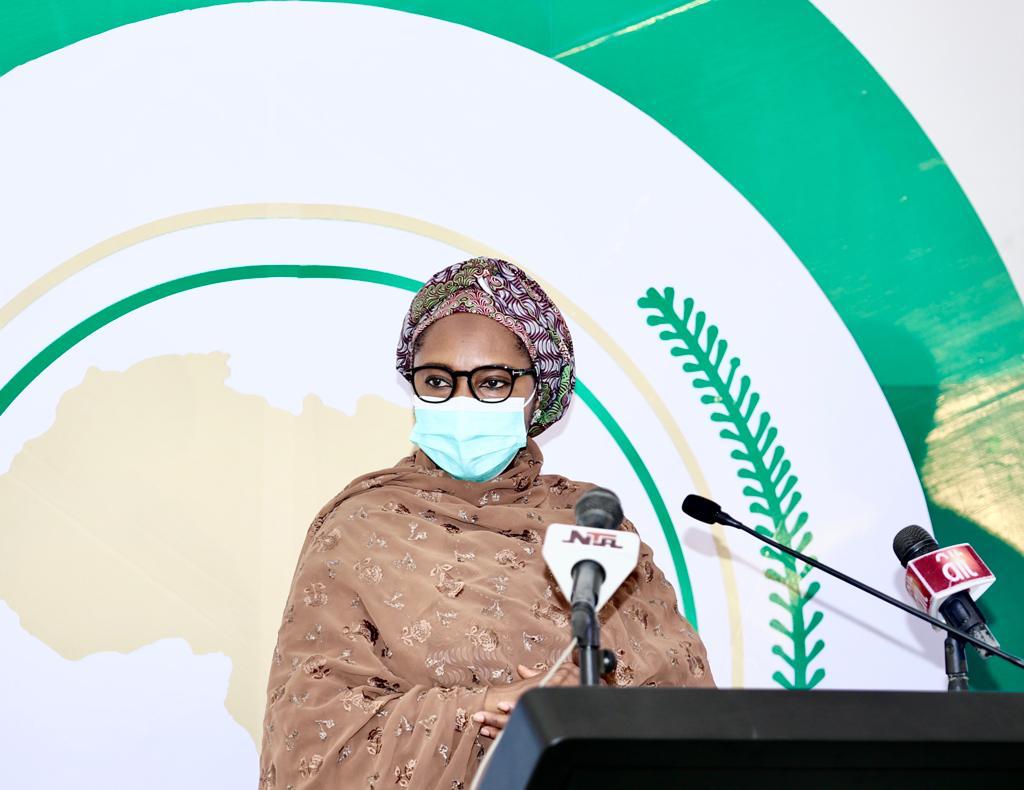Many Nigerians if not all should rather be obsessed with finding out what government has been doing, so that they don’t end up missing out on the many potential opportunities emerging/arising from the actions of the government, because it is often too much time talking, not enough time listening or paying attention, more so beyond sentiment.
Just within the second half of this President Buhari- led administration, there have been achievements and, of course, challenges. The achievements so far recorded, as driven by Mrs. Zainab Ahmed, the Honourable Minister of Finance, Budget and National Planning, and the challenges faced in the course of executing the policies have been clearly highlighted by the Honourable Minster herself, of course because she has been involved in seeing to the success of the economic policies.
The rounded mid-term and long-term plans (the medium-term national development plan (MTNDP) 2021-2025 and the long -term plan agenda 2050) meant to succeed vision 2020 and the economic recovery and growth plan (ERGP) had commenced respectively. The development of the macro economic framework for the proposed medium-term plan as well as the perspective plan had also commenced. The 2020-2023 MTEF which has been passed by the NASS was prepared. The monitoring and evaluation (M and E) mechanisms were institutionalised by finalising matrix and targets to each ministerial key performance indicators (KPIs). The key ministries departments and agencies (MDAs) have established performance matrix to track and measure the presidential deliverables (2019 – 2023) to ensure improved service delivery. To enhance the quality of data, this administration has approved the establishment of a Geo-Reference Infrastructure and Demographic Data for Development (GRID3). This is aimed at providing high resolution data for sustainable planning.
The budget process, for example, was completed within a period of two months and successfully reversed the budgetary cycle to Jan. – Dec. 54.9 percent overall revenue outturn was achieved (66 percent for oil, 31 percent for non-oil) as at Q2’ 2020. Also achieved was 90.4 percent recurrent expenditure, 86.9 percent debt service, 31 percent capital expenditure) as at Q2’ 2020. The increase in minimum wage was funded, and there was continued monthly reconciliation and revenue performance monitoring by Presidential Revenue Monitoring and Reconciliation Committee (PRMRC).
This administration has achieved the passage of the Finance Act. 2019 at a record time before the 2020 budget. According to the Honourable Minister, “Through the Finance Act, we have achieved the following: Value added tax (VAT) rate increase from 5 percent to 7.5 percent, which was implemented in Feb. 2020; introduction of a N25million threshold for small and medium enterprises (SMEs) for eligibility for VAT collection; reduced of tax rates for SMEs (0 percent and 20 percent respectively); administering of the Finance Act 2019; automation of import duty exemption certificate (IDEC) and vehicle registration (V-REG); and automation of the collection of stamp duty.
The government has provided N802.82 billion as new domestic borrowing to part-finance the deficit in the 2019 Appropriation Act. The funds were mainly deployed to capital projects like roads, bridges etc. It successfully raised N100 billion sukuk bonds in 2018 and provided N1,319,986 billion, out of the total borrowing of N1,564 billion in the 2020 Appropriation Act, to part-finance the budget deficit.
For COVID-19 response and fiscal stimulus, the federal government provided debt relief to states to relieve them of debt service obligations for 2020, developed a N2.2 trillion economic stimulus plan to help cushion the effects of COVID-19, provided N500 billion for COVID-19 Crisis Intervention Fund; N263.63 billion of which will be drawn from federal government special accounts, N186.37 billion from Federation Special Accounts and the balance of N50 billion is expected as grants and donations, reviewed 2020 Budget based on the current realities (oil price shock and COVID-19 pandemic) as well as funded the Presidential Task Force on COVID-19 response, mobilised funding from domestic and external sources for the implementation of 2020 budget (Raised domestic revenue for the budget deficit but as a result of weakness of the foreign market, and converted foreign borrowing to local currency in other to cushion the effect of the oil price shock and COVID-19 pandemic).
The National Sovereign Investment Agency (NSIA) invested over US$22.5million in the development, construction and operationalisation of three tertiary healthcare facilities in Lagos, Kano and Abia States. Combined, the three centres are to provide training for over 200 healthcare professionals and facilitate the delivery of high quality, affordable and accessible healthcare services to Nigerians. The centres are meant to save an estimated US$1billion in foreign exchange that Nigerian’s expend on medical tourism annually.
The economic policy drive of Mrs. Ahmed has ensured that the government provided palliatives to taxpayers in addition to other palliatives contained in the Finance Act, 2019, which will help stimulate the economy post-COVID. Some of these include: Late returns penalty (LRP) was waived for taxpayers who pay early and file later; allowing supporting documents to be emailed to the dedicated email addresses or submitted later to the tax offices by those who are not able to use the email facility; remittance of VAT on or before 21st of every month was extended to the last day of the month; and taxpayers facing challenges in sourcing for forex to offset their tax liabilities were given the option of paying in Naira at the prevailing investors and exporters (I and E) forex window rate on the day of payment.
The government relaunched the strategic revenue growth initiative (SRGI) with MDAs (portfolio owners) charged with responsibility of establishing Project Implementation Units (PIUs), and completed the opportunity sizing of incremental revenue with clear identification of potential revenue expected of each source.
However, a deep dive into oil revenue streams show some good results from reforms (VAT and Stamp duty), which include: Achieving 54.9 percent overall revenue outturn (66 percent oil, 31 percent non-oil Q2, 2020); the stamp duty which increased by 40 percent from N3,386,648,663.85 in Q1, 2019 to N4,750,893,578.48 in Q1, 2020; and VAT also increased by 27 percent at the customs level and 13 percent at the non-import level.
The federal government reviewed tax expenditures and exemptions by reducing sectors eligible for pioneer status incentives under the industrial development income tax relief Act (‘IDITRA’), as well as auto policy incentives and import duty exemptions. It restructured Social Investment Programme (SIP).
The government has worked with the international community of donors, nations, multilateral organisations, etc. to raise concessionary resources for the nation, including COVID-19 response. In the light of this, it signed a total of $2,534,880,717.6 as follows: African Development Bank (AfDB) – $278,093,093; IFAD – $89,100,000; World Bank IDA – $1,573,248,600; AFD – $201,911,909,23; and China-Exim Bank – $392,526,218.37.
The government created the Presidential Infrastructure Development Fund (PIDF) which is being managed by NSIA for the development of four roads and one critical power infrastructure projects namely: Lagos-Ibadan Expressway, Second Niger Bridge Project, Abuja-Kano Road, Mambila Hydro-Power Project, and East West Road. The projects, worth over N2.5 trillion, will stimulate economic activities across the country, create direct and indirect employment, improve the wellbeing of citizens and significantly bolster the quality of lives in the rural economies around each infrastructure.
On infrastructure financing, the government provided N802.82 billion as new domestic borrowing to part-finance the deficit in the 2019 Appropriation Act, which were mainly deployed to capital projects, ranging from roads, bridges, etc. It deployed the bulk of the proceeds of the N100 billion Sukuk raised in 2018 towards the rehabilitation and repairs of 28 road projects across the six geopolitical zones of the country. The federal government developed refurbishment investment tax credit scheme (RITCS) which was signed via an Executive Order no7 by Mr. President to utilise tax expenditures, refundable by way of tax credits, to finance the construction of critical roads infrastructure through a public private partnership (PPP) mechanism. Under this scheme, the pilot is being led by the following: Dangote Industries Ltd; Lafarge Africa Plc; and Unilever Nigeria Plc. The investors are meant to invest in 19 eligible road projects, totalling 794.4km which have been prioritised in 11 States across each of the six geo-political zones. Looking at all these achievements, and even more which is not captured here, it is advisable for Nigerians to take the government a lot more seriously.






